#Peter Juul
Text
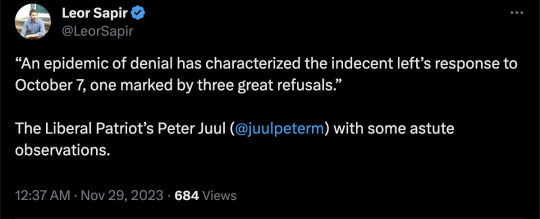
By: Peter Juul
Published: Nov 28, 2023
More than twenty years ago, the philosopher Michael Walzer famously asked whether or not there could be a “decent left.” After seeing the left’s reaction to the heinous October 7 terrorist atrocities in Israel, the answer is clearly no, there is no decent left—and we shouldn’t expect one to come into being any time soon.
It seemed that this indecent left had gone into remission with Russia’s invasion of Ukraine in February 2022. Outside a subset of inveterate anti-American ideologues, it was left to self-proclaimed realists to make the case for letting Moscow’s aggression against Ukraine stand—or, failing that, negotiate a settlement that would reward the Kremlin with chunks of Ukrainian territory. Indeed, a number of individuals affiliated with the so-called “restraint” school of foreign policy disassociated themselves from their erstwhile comrades while Democratic political leaders brutally smacked down half-baked calls from progressives to negotiate away Ukrainian sovereignty on terms favorable to Vladimir Putin.
But the indecent left roared back to life with a vengeance almost immediately after October 7, excusing and “contextualizing”—and sometimes outright denying—deliberate mass murder, rape, and kidnapping of ordinary Israeli civilians and foreigners. Outright anti-Semitism permeated the indecent left’s reaction to the Hamas terror attacks from the start, with a number of left-wing activists, academics, and intellectuals alike either celebrating or apologizing for the pogrom as soon as it occurred. At best, the left issued impotent calls for an immediate ceasefire that amounted to demands that Israel do nothing after 1,200 of its citizens were brutally massacred and another 240 or so taken hostage by Hamas and its allies.
If anything, the pathologies Walzer described two decades ago have only gotten worse. This is not a political movement that wants to think seriously or coherently about the war between Israel and Hamas or foreign policy and armed conflict more generally; as Walzer wrote twenty years ago, “ideologically primed leftists were likely to think that they already understood whatever needed to be understood.” An epidemic of denial has characterized the indecent left’s response to October 7, one marked by three great refusals.
A refusal to deal with the problem at hand: what to do about Hamas?
Many ceasefire calls mean well: ordinary people are understandably appalled by the death and destruction and quite reasonably just want it to stop. While this humanitarian sentiment is commendable, it fails to address the question at the heart of the current conflict: what to do about Hamas in the wake of October 7? Other much-touted ceasefire calls from politicians like Sen. Jeff Merkley (D-OR) essentially amount to terms of surrender for Hamas—immediate release of all hostages, giving up arms, and relinquishing control over Gaza. Likewise, the hostage release deal the Biden administration and Middle East partners brokered between Israel and Hamas only temporarily pauses the fighting.
Most immediate ceasefire calls coming from the indecent left essentially call for Israel to do nothing in response to October 7. Occasionally they come with provisions requiring Hamas release the hostages it took during its attack, but typically they amount to demands for a unilateral Israeli ceasefire without any explicit reciprocity from Hamas to, say, stop firing rockets into Israeli cities. Worse, they fail to take into account repeated threats by Hamas leaders to carry out October 7-style pogroms over and over again, much less the terrorist group’s long-standing, recently restated objective of destroying Israel itself. Since October 7, it’s obvious that many on the indecent left would have no problem with that outcome.
When asked what Israel—or America and the world at large—should do about Hamas after the cruelty of October 7, the indecent left’s repeated calls for an immediate ceasefire make clear that its answer is, at best, “nothing.” There may not be any good answers to this question, but “nothing” remains a grossly inadequate response.
A neo-Orientalist refusal to take either Palestinians or Israelis seriously
By and large, the indecent left has also demonstrated a remarkable lack of curiosity about either Palestinian or Israeli society and politics. It’s part and parcel of what TLP’s Brian Katulis dubbed neo-Orientalism: the use of nations and people overseas as props in America’s own domestic political debates. In particular, the indecent left spouts simplistic slogans while it professes “great concern and sympathy for the people of the region, while remaining largely indifferent to the diversity of backgrounds and perspectives within particular countries and societies.” That’s especially acute when it comes to discussions of Israel and the Palestinians, where the indecent left attempts to force the conflict into its own parochial ideological frameworks of “decolonization,” “white supremacy,” and “systemic racism.”
In other words, the indecent left thinks it already knows everything it needs to know about any given conflict—and especially any conflict that involves Israel. While “decolonization” provides the indecent left with a marginally coherent ideological framework, it amounts to little more than a “historically nonsensical” but nonetheless toxic stew of Soviet-era propaganda, half-baked academic theories, and contemporary identity politics. That includes the vogue to blame anything and everything on a mystical, all-pervasive white supremacy of which Israeli Jews somehow bizarrely partake. Why should the indecent left engage with the particularities of Palestinian politics or even give so much as a second glance to Israeli society when its ideology already gives it all the answers it needs?
As a result, the indecent left engages very little with actual Palestinian politics and society. It refuses to grant Palestinians any real agency and therefore refuses to acknowledge any real politics among Palestinians themselves, much less the fact that Hamas has repeatedly put forward an openly genocidal program or that it violently suppresses dissent among the Palestinians under its authority. Instead, many on the left fantasize about a single binational state in what was once the British Mandate of Palestine—something few Palestinians actually favor. Other leftists endorse slogans calling for a single Palestinian Arab state, but either way few of them actually delve into the complex power dynamics within Palestinian society—including those factions that don’t respect the basic rights and freedoms of a wide range of people.
If indecent leftists generally fail to engage with Palestinian politics and society in any meaningful way, they actively avoid any sort of real engagement with—or even understanding—of Israeli society and politics. At best, the indecent left ignores Israeli society and politics; at worst, it views Israeli society as somehow counterfeit. Other segments of the indecent left, especially in academia, actively discourage any engagement with Israelis and Israeli institutions. With zero understanding of Israeli society and politics, it cannot understand Israeli fears or motivations in any real way. The indecent left doesn’t know anything about Israeli society, and it doesn’t want to know anything about it.
A refusal to make elementary—if difficult—moral and ethical distinctions
In its rhetoric and analysis of the war between Israel and Hamas, the indecent left frequently equates the deliberate and premeditated murder, rape, and kidnapping of ordinary civilians with the inadvertent and unintentional deaths of civilians in what appear to be otherwise legitimate and legal military operations. Here as elsewhere, the left refuses to make what Walzer calls “one of the most basic and best understood moral distinctions: between premeditated murder and unintended killing.” At some fundamental level, many on the indecent left understand this distinction—as seen by the strenuous effort to portray just about any and every Israeli military action as unlawful and illegitimate by definition.
It may well be the case that the Israeli military has played fast and loose with the laws of war or committed war crimes in its war against Hamas. The sheer amount of ordnance dropped on Gaza between October 7 and the start of the Israeli ground offensive roughly three weeks later remains stunning—but it’s not necessarily illegal. It’s entirely legitimate and very much appropriate to question how well or how seriously the Israeli military takes its obligations to protect civilians, but as Walzer points out it’s impossible for any military to fight a war without putting civilians at risk. The Israeli military can and should probably do a better job protecting civilians, but it’s unrealistic to expect any war to end with zero civilian casualties.
By contrast, the indecent left remains either silent or in denial about blatant Hamas war crimes. It’s been an open secret for well over a decade that Hamas uses hospitals, schools, mosques, and other protected civilian buildings and facilities as command centers and bases for operations against Israel; sources ranging from the New York Times and PBS to non-governmental organizations typically unsympathetic to Israel like Amnesty International and even UNRWA attest to this fact. It’s not surprising to see the maze of tunnels uncovered beneath the Shifa hospital complex, nor is it shocking to see that Hamas brought hostages seized on October 7 to this medical facility. These Hamas abuses don’t even cover the deliberate and premeditated targeting of civilians for murder and rape on October 7 itself.
Then there’s the moral equivalence many on the indecent left have drawn between Israeli hostages held by Hamas and Palestinians jailed by Israel. There are many flaws and abuses in the way Israel treats detained Palestinians (particularly in East Jerusalem and the West Bank), but it’s hard to know what drives people to try and establish a moral equivalence between a four-year-old abducted by Hamas after terrorists killed her parents and a failed car bomber. However, that’s typical of an indecent left that tears down posters of hostages held by Hamas after October 7.
In its failure to make difficult but necessary moral distinctions, the indecent left contributes in its own way to the erosion of both the laws of war and the idea of crimes against humanity. It diminishes the force of both while giving the perpetrators of actual war crimes and atrocities effective political and moral cover. If there are no relevant distinctions between legal and legitimate actions in war and illegal and illegitimate ones—much less between legal and legitimate military operations and deliberate atrocities like October 7—it simply makes war even more brutal and appalling crimes against humanity more likely.
* * *
The pathologies of the indecent left burst out into the open once again after October 7, but they’ve been present in large swathes of the left for decades now. It’s difficult to escape the conclusion that these pathologies are inherent to and embedded in the left, and that no amount of argumentation or persuasion will eliminate or mitigate them. There are many decent leftists, but there is no decent left.
What should liberals and decent leftists do, then?
First, recognize that the indecent left is not your friend in any way, shape, or form. Indeed, the indecent left sees liberals and decent leftists—not conservatives or right-wing populists—as its primary adversaries. Even when there are ostensible areas of agreement, the underlying analysis and motivations and goals of the indecent left stand at odds with those of the broader center-left. It may not seem like much, but it’s important for mainstream liberals and decent leftists to understand this basic fact.
As a corollary, it’s important to note that the indecent left remains a small faction in American politics—it’s a paper tiger that garners excessive attention through activity on social media platforms and destructive political tactics. Different polls use different definitions and give different results, but the “progressive left” amounted to just six percent of the population in a 2021 Pew poll and eight percent in the 2018 Hidden Tribes poll.
Next, quarantine the indecent left. Much as mainstream liberals and decent leftists did in the late 1940s, today’s liberals and decent leftists must establish intellectual and political firewalls against the indecent left. That’s easier said than done, especially given the structure of contemporary center-left politics; unions and political parties that once filtered out bad-faith actors and indecent politics have weakened enormously in the intervening decades. Many of the same problems that plague domestic politics—an overreliance on college-educated professionals from foundation-funded non-profit institutions to staff government offices and agencies, for instance—likewise make it more difficult to combat indecent leftists on foreign policy.
Finally, liberals and the decent left need to articulate their own vision of foreign policy. The Biden administration and others on the mainstream center-left have been slowly groping their way toward this vision, particularly after the Russian invasion of Ukraine in February 2022. But liberals and the decent left need to accelerate their own efforts to establish a foreign policy that stands in opposition not only to the indecent left but the isolationist America First right and the technocratic approach of the post-Cold War era. It’s an urgent task that can no longer be postponed.
Liberals and decent leftists did it once before, albeit under vastly different circumstances. But that should give us hope that we can do it again today.
#Peter Juul#indecent left#hamas supporters#antisemitism#liberalism#liberal ethics#liberal values#islam#islamic terrorism#hamas#hamas terrorism#moral confusion#illiberalism#religion is a mental illness
7 notes
·
View notes
Text

my first two jobs ever, in order, were "board game teacher" and "university library assistant," so tho I've never formally studied games (I have been dropping out of college on and off since 2015, and was a freshman in 2012 lmao) I've been casually exposed to games and the people who make and play them in a professional context, as well as having the research skills to help close the gaps. i actually kind of hate playing board games but i loved GM-ing the coop arkham horror and watching my players, which i did for seven years straight.
my current fixation is the result of several years' fucking around on YT watching all kinds of game content, from LPs to specific game dissection to video essayists. jacob geller and folding ideas are kind of gold standards, but this week I've been really enjoying errant signals in particular. Sometimes I'm introduced to concepts this way - ludonarrative dissonance, ergodic literature, the magic circle, etc. that, and getting recommendations from friends or accidentally stumbling into game studies via other research (such as the paper i wrote a few years ago on theater-as-games in prison contexts). most of it though is having thoughts and opinions on things and letting it percolate until i am dangerous enough to find someone who's already explained a concept better than I could, and then running with that. find something that cites its sources, and then chase the ones that seem interesting.
my syllabus post is very much not a reclist, though i do in varying ways recommend everything on that list and it might be of use. here's some stuff I think would be great starting points:
Rules of Play - Game Design Fundamentals, Salen and Zimmerman. This book is an excellent resource, as it introduces a wide variety of scholars who you can dive into as it is relevant to your interests as well as providing tons of useful frameworks and vocabulary to go hunting. It's an easy read with concise bullet-point summaries after each chapter, and the PDF is hyperlinked for easy navigation. I might have found this via Wikipedia, honestly.
A Play of Bodies: A Phenomenology of Video Game Experience, Keogh. What I'm currently liveblogging - it is firmly a literary/philosophical work, rather than by/for designers, and correspondingly it's a little more difficult without at least passing familiarity with cyborg theory or any brand or offshoot of post-modernism, but still fairly digestible and a great read so far.
My Life as a Night Elf Priest: An Anthropological Account of World of Warcraft, Nardi. Found this during my theater-and-games paper, and MMO anthropology is not really my thing, but it's a nice complement to the other books as an explicitly player-theorist perspective. Also provides a more approachable introduction to a variety of theorists and sources. (Open access on JSTOR!)
Draw Your Weapons, Sarah Sentilles. I'm biased because I discovered this book by accidentally attending an author event at my local museum, and the games portion is incidental, but if you can find it I think this analysis of the relationship between depictions of violence and violence itself is worth your time. Memorable re: games for its discussion of Press F To Pay Respects.
here are some videos which I offer as examples of channels you might enjoy diving into, looking for additional jumping-off points:
Playing as Anyone in Watch Dogs Legion, Errant Signal. I really appreciate Errant Signal's thoughtful, personal approach to analysis and especially his highlighting of buried gems in his Blips series as well as his non-self-deprecating reevaluation of some of his older analyses over his decade plus career making videos.
Controllers Control Everything, Game Makers Toolkit. Discovered via the Boss Keys series highlighting the souls games, and although I think his channel is (increasingly) geared toward devs, these are well-constructed, thoughtful videos about many aspects of game design. Even when I don't personally get what makes him enjoy Zelda dungeons in that specific way (I'm an outlier), I appreciate his analysis.
Mega Microvideos 2, Matthewmatosis. Perhaps better known for his extremely long-form essays, I love Matthewmatosis' series of microessays framed like Wario Ware minigames. They are brief but don't pull punches, and the format is uniquely delightful. (See also this microessay mixtape.)
Making Sense of Catherine Full Body, SuperButterBuns. She doesn't do much essay content, I guess, but I she loves Catherine and the Persona series, and this dissection of Catherine Full Body is an absolute treat.
Jon Bois. Okay, mostly not about games, but like - come on. 17776 and Breaking Madden, alongside everything else he's ever done, fit because I feel like they do. If nothing else, I think Pretty Good and his general use of Google Earth as a medium for storytelling have a lot of utility in talking about digital media. He's good for the soul.
The Future of Writing About Games, Jacob Geller. One of the gold standards for a reason - and especially if you're looking for further solid recommendations for other writing/creating about games. This video in particular discusses & links to some really great pieces, but his Big List of Other People's Video Essays is also a great way to spend the next month of your life. (You might notice some crossover between this list and his, only some of which is coincidental.)
if i have any conclusion, it's that my current fixation on digital literalism is me finally finding an outlet/academic match-up with a fascination i developed in 2015 when studying gonzo lit. i think the utility of academia and the long history of scholarship on a given topic, as a non-academic, is to help you express ideas or reinterpret beliefs or experiences you've had to others without having to reinvent the wheel. i always become most energized when i stop worrying about knowing all the bg and chase whatever is useful and affirming or enlightening to me. and you can get pretty far if you think about why you like what you do, and just - enthusiastically also consume non-academic stuff. maybe this is a note more for myself! but thank you for the opportunity to monologue.
#peter answers#metanarratives#rules of play#masterpost#i almost talked abt some Classics like huizinga & juul & piaget etc. but frankly. if you decide you want to read those you'll find citation#when someone inevitably (& frequently) references them & you can chase them if you like. i've read piaget it's not relevant MOST of the tim#and. man i do love monologuing but also!!! i think i could stand to be more plan language - i want to.#learning always happens in dialogue for me. even if it's ask-and-answer. so i'm always v grateful when people indulge me.#ANYWYA sorry i posted this and immediately privated it bc i meant to draft it during work yesterday.#long post
27 notes
·
View notes
Photo
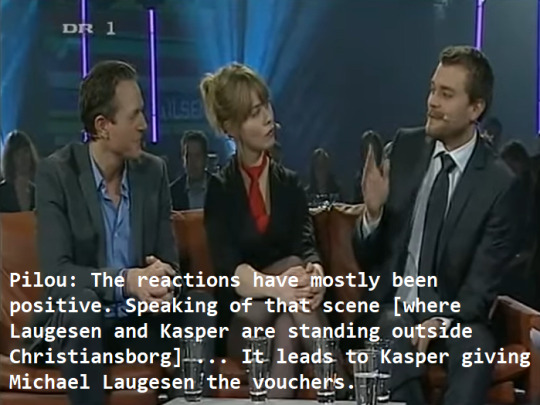
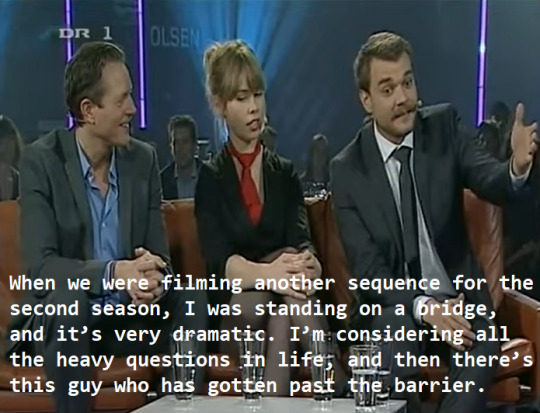
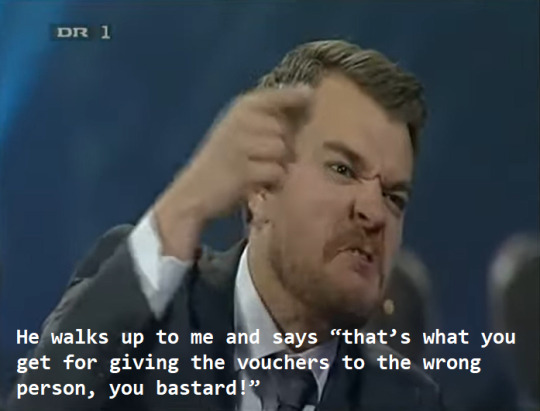

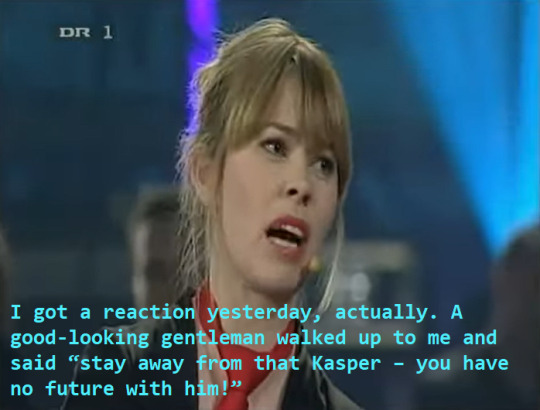
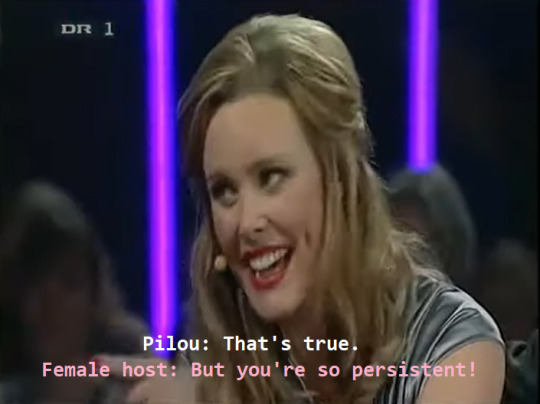
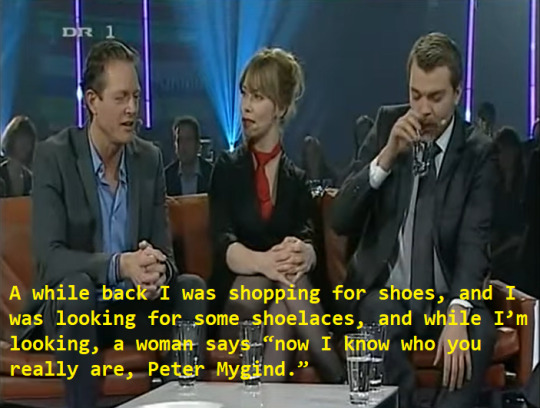
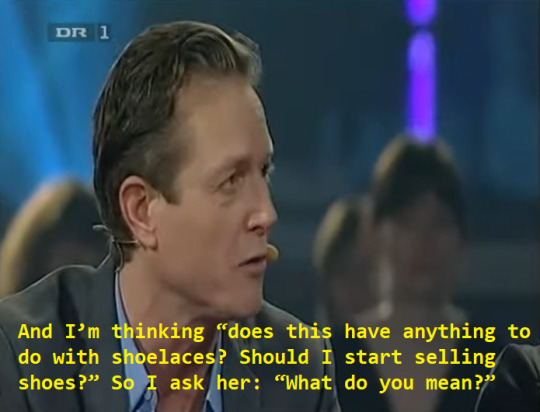
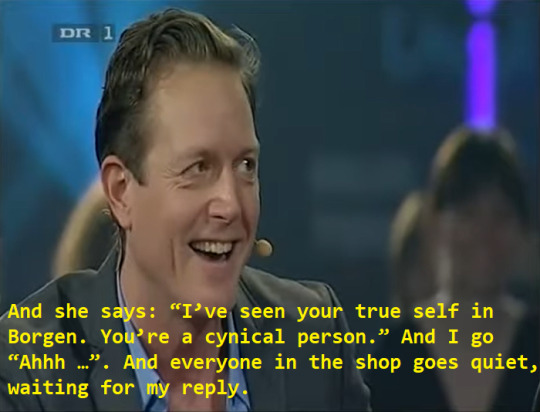

Pilou, Birgitte and Peter talking about the reactions they’ve gotten to their roles on the first season of Borgen (click here for the Danish video).
I love how the female host is a Kasper x Katrine shipper like the rest of us.
#borgen#pilou asbæk#birgitte hjort sørensen#peter mygind#kasper juul#katrine fønsmark#michael laugesen#loosely translated#poor peter#he really is the sweetest guy in real life
13 notes
·
View notes
Text
The Kingdom (1994, 1997) & The Kingdom: Exodus (2022)

"Movie" #1,133 • Ranking Lars Von Trier #5
There are so many inexplicable twists and turns and forced cliffhangers in the last fifteen minutes of what remains the series finale, the eighth and final episode of The Kingdom, that you might forget how smooth and cohesive the otherwise bonkers story came together in totality. Clocking in at nearly ten hours, Lars von Trier's "Twin Peaks in a hospital," shot and released on Danish TV in the mid 90s in two 4-episode seasons (1994 & 1997), is a hard-to-find gem that deserves far more attention if not recognition for being just about the weirdest fucking thing I've ever seen released on a mainstream platform (if we can call Danish TV a "mainstream platform").
I was perhaps most impressed by LVT's ability to juggle upwards of a dozen different storylines which seamlessly crossed and merged when they needed to. I feel some unease with how it ended given this segment of an interview I recently watched on YouTube with a slightly demented-seeming if not sickly Trier. Is he really going on about how not having an ending is a problem? Did he ever even watch this? Does he have any recollection making it? But for the love of god, this man can't help but being an insane and inscrutable maniac for one minute; so, he can get away with it. Few can.
Saying one thing when you mean another is a trick, which is not unlike the whole of LVT's filmography. On one hand, this is among his most accessible works: a procedural genre drama. And on the other, it's a thing where Udo Kier plays the double role of Demon from Hell and a baby born with a normal adult-sized head whose body grows exponentially gigantic by the day until he's like seventeen-feet long screaming for his mother to kill him, which–SPOILERS!–she does.
I will hold off from saying more at this juncture as, apparently, there might be a third and final season on the way, à la another famously long-dormant television franchise from a luminary auteur. But this being Lars von Trier, who the hell knows.
THREE YEARS LATER…
"With this being Lars von Trier, who the hell knows" was an appropriate way to end my initial review of The Kingdom for the S.O.B. went ahead and did it: he finished his small screen masterpiece and gave it an ending for the ages. Having just completed the long-awaited Season 3 here in 2023, with future von Trier projects somewhat up in the air after his recent Parkinson's diagnosis (he says he will continue making movies for as long as he can, and I hope he does, but who knows), I can say that if that is indeed his final project, it's certainly a worthy one to go out on.
To get this out of the way (as anyone writing about The Kingdom: Exodus is legally required to mention within the first two paragraphs): the comparisons to Twin Peaks: The Return are as unavoidable as they are perfectly and eerily apt. LVT was getting compared to Lynch well before he decided to complete his own visionary TV show 25 years later as well. But, while the initial inspiration for The Kingdom had to have been spurred by the groundbreaking Twin Peaks, his conclusion and how he went about it is vastly different. Both are phenomenal, in my opinion, but where Lynch departed from the original framework and story to the nth degree, von Trier's return is firmly grounded in the tone and aesthetic of the original run. Outside of a very meta beginning and ending, Exodus feels like a natural continuation of the story, in the same location with the same sepia-drenched sheen. There's no excursions to the purple ocean world or Buckhorn, South Dakota here.
Not to say he doesn't get weird or try different things within this original landscape, because he does so IN SPADES. It's a thrilling, hilarious and endlessly wild ride in five one-hour installments. The biggest hurdle (and main reason the final season was shelved for so long) were the deaths of several notable actors in prominent roles. He handles this with nuance and boundless creativity. It never feels like an homage because it's so rich, fresh and new. Ernst-Hugo Järegård's Dane-hating Helmer is replaced by his son (as Helmer Jr., comically nicknamed "Halfmer" by the Swede-roasting staff); Jens Okking as Bulder is simply exchanged for a look-alike (Nicolas Bro); and Sigrid Drusse (Kirsten Rolffes), the truth-seeking heart of the show is swapped out for a new lead, a similarly aged Karen (Bodil Jørgensen), who begins the action in the non-sepia "real world" watching the original two-season run of The Kingdom on DVD; and Udo Kier… well, please just watch it to see what they do with Udo Kier.
The meta narrative is fascinating, as everyone in Copenhagen's Rigshospitalet is well aware of the madman Lars von Trier and his awful, fucked up TV series. LVT's own credit-roll commentary also returns (although he speaks behind a red curtain now out of vanity; only his jittering shoes are visible), as does a new Greek chorus of male and female dishwashers: gone are the actors with Down syndrome, replaced by a robot (who's constantly breaking dishes) and a man with a different, and a more severe genetic disorder. As is often the case, many of these choices range from squeamish to deliriously comedic, often simultaneously, but when — MAJOR SPOILER — von Trier himself arrives in a helicopter in the role of none other than Satan, how can you not smile?
If I had known going in that some of the threads in Exodus were going to touch on culture wars stuff, I would have said, "Oh no." But everything is handled with such ease — from #MeToo to Nazism! — and, more importantly, humor. This shouldn't work on paper, but it does.
I watched this on the heels of the Nymphomaniac Director's Cut and came away with a similar take: that LVT is really great at longer form storytelling. Some of his very best work is also the longest, and I don't think that's an accident. He's always tried to distill BIG IDEAS into thoughtful if not nihilistic and absurdist scenarios (Willem Dafoe plays one of the devil's minions who's also an owl), but even when the action makes you want to scream or walk into traffic, there's a cleverness at play which brings it full circle. The shift from the neurological to the cardiological departments (via Birgitte Raaberg's character) is such a lovely and simple notion. The head vs. the heart. You can make a big complicated thing with boundless metaphors, but what does it matter if you don't feel anything? The idea that this is all just a mad artist's foolish creation seems to be the ultimate point and that is a fitting send-off for von Trier in a way, I think. It's cheap on the one hand (it's supposed to be), but also a perfect example/explanation of art as entertainment and/or vice versa. Exodus — yes, like The Return — is as standalone fascinating as it is successful; honoring, but more importantly elevating the original series in the most magical ways.
SCORE: ⭐️⭐️⭐️⭐️⭐️⭐️⭐️⭐️⭐️⭐️
#lars von trier director#1994#1997#2022#10#🇩🇰#tv shows#horror#søren pilmark#ghita nørby#birgitte raaberg#peter mygind#ernst-hugo järegård#kirsten rolffes#holger juul hansen#jens okking#baard owe#bodil jørgensen#nicolas bro#nikolaj lie kaas#lars mikkelsen#mikael persbrandt#tuva novotny#ida engvoll#otto brandenburg#annevig schelde ebbe#udo kier#willem dafoe
0 notes
Photo

Juulna
See Juulna’s existing works here.
Preferred contact methods:
Tumblr: juuls
Email: [email protected]
Discord: Juulna#0508
Preferred organizations:
- Anything from the list of approved organizations
Will create works that contain:
I love tropes! Soulmate ones are a particular favourite of mine. But overall, I'll record almost anything as long as it's not in my DNW list. I love fics with genderbent characters, and am always interesting in exploring minorities as characters, whether addressed in canon or even if it's just part of the story: disabilities, ace/aro characters, non-binary and trans and genderfluid characters, racebent characters, and more.
Will not create works that contain:
I will not record: incest, underage (unless both characters are underage), rape, abuse, and gaslighting. Right off the bat, I don't write or read Starker or really any fics with Peter with anyone except his schoolmates or, like, Deadpool. I'm not as into No Power AUs, but I'm just a podficcer and am happy to negotiate as it's your work (or another's whom you gained permission from).
-- Podfic --
Auction ID: 1081
Will create works for the following relationships:
Bucky Barnes/Steve Rogers/Tony Stark - MCU
Tony Stark-centric - MCU
JARVIS & Tony Stark - MCU
Iron Man fandom any gen - MCU
Bucky Barnes/Darcy Lewis - MCU
Bucky Barnes/Darcy Lewis/Steve Rogers - MCU
Bucky Barnes/Loki/Tony Stark - MCU
Steve Rogers/Any - MCU
Tony Stark/Any - MCU
Loki/Tony Stark/Stephen Strange - MCU
Work Description:
I am looking to podfic fics under or at 20k words (or a combination of fics that fall under that). I love fics with genderbent characters, and am always interested in exploring minorities as characters, whether addressed in canon or even if it's just part of the story: disabilities, ace/aro characters, non-binary and trans and genderfluid characters, racebent characters, and more. I did list mostly Tony ships, but if your ship doesn't include him I am perfectly happy to pod that fic anyway, as long as there isn't Tony-bashing going around. Rare pairs are always welcome! Please see my DNWs for ships I will not podfic.
I very much love tropes, especially soulmate ones! Prefer not to read a No Powers AU. but it's acceptable. :) I am willing to address Civil War fix-its as long as it's not very anti-Tony. Please see my DNWs for subjects I won't record, unless carefully done, though I am absolutely fine if you want to reach out to me during the preview/auction weeks and see if your fic would be an exception.
Thank you for considering bidding on me!
Ratings: Gen, Teen, Mature
Can pods bid on this auction? Yes - Podbids welcome!
CLICK HERE TO BID ON THIS WORK
-- Podfic --
Auction ID: 2045
Will create works for the following relationships:
Bucky Barnes/Darcy Lewis/Steve Rogers - MCU
Bucky Barnes/Loki/Tony Stark - MCU
Bucky Barnes/Steve Rogers/Tony Stark - MCU
Tony Stark-centric - MCU
Bucky Barnes/Tony Stark/Stephen Strange - MCU
Iron Man fandom any gen - MCU
JARVIS & Tony Stark - MCU
Harley Keener & Peter Parker & Tony Stark & Riri Williams - MCU
Pepper Potts/Steve Rogers/Tony Stark - MCU
Steve Rogers/Any - MCU
Work Description:
I am looking to podfic fics under or at 20k words (or a combination of fics that fall under that). I love fics with genderbent characters, and am always interested in exploring minorities as characters, whether addressed in canon or even if it's just part of the story: disabilities, ace/aro characters, non-binary and trans and genderfluid characters, racebent characters, and more. I did list mostly Tony ships, but if your ship doesn't include him I am perfectly happy to pod that fic anyway, as long as there isn't Tony-bashing going around. Rare pairs are always welcome! Please see my DNWs for ships I will not podfic.
I very much love tropes, especially soulmate ones! Prefer not to read a No Powers AU. but it's acceptable. :) I am willing to address Civil War fix-its as long as it's not very anti-Tony. Please see my DNWs for subjects I won't record, unless carefully done, though I am absolutely fine if you want to reach out to me during the preview/auction weeks and see if your fic would be an exception.
Thank you for considering bidding on me!
Ratings: Gen, Teen, Mature, Explicit
Can pods bid on this auction? Yes - Podbids welcome!
CLICK HERE TO BID ON THIS WORK
-- Podfic --
Auction ID: 3016
Will create works for the following relationships:
Bucky Barnes/Darcy Lewis/Steve Rogers - MCU
Bucky Barnes/Loki/Tony Stark - MCU
Bucky Barnes/Steve Rogers/Tony Stark - MCU
Tony Stark-centric - MCU
Bucky Barnes/Tony Stark/Stephen Strange - MCU
Iron Man fandom any gen - MCU
JARVIS & Tony Stark - MCU
Harley Keener & Peter Parker & Morgan Stark & Tony Stark - MCU
Pepper Potts/Steve Rogers/Tony Stark - MCU
Steve Rogers/Any - MCU
Work Description:
I am looking to podfic fics under or at 20k words (or a combination of fics that fall under that). I love fics with genderbent characters, and am always interested in exploring minorities as characters, whether addressed in canon or even if it's just part of the story: disabilities, ace/aro characters, non-binary and trans and genderfluid characters, racebent characters, and more. I did list mostly Tony ships, but if your ship doesn't include him I am perfectly happy to pod that fic anyway, as long as there isn't Tony-bashing going around. Rare pairs are always welcome! Please see my DNWs for ships I will not podfic.
I very much love tropes, especially soulmate ones! Prefer not to read a No Powers AU. but it's acceptable. :) I am willing to address Civil War fix-its as long as it's not very anti-Tony. Please see my DNWs for subjects I won't record, unless carefully done, though I am absolutely fine if you want to reach out to me during the preview/auction weeks and see if your fic would be an exception.
Thank you for considering bidding on me!
Ratings: Gen, Teen, Mature, Explicit
Can pods bid on this auction? Yes - Podbids welcome!
CLICK HERE TO BID ON THIS WORK
The auction runs from October 22 (12 AM ET) to October 28 (11:59:59 PM ET). Visit marveltrumpshate.com during Auction Week to view all of our auctions and to place your bids!
6 notes
·
View notes
Text

‘Suspect’ Season 2: Dominic Cooper, Tamsin Greig, Eddie Marsan & More Join Channel 4-Britbox International Drama Series
By Jesse Whittock
November 15, 2023 7:20 am
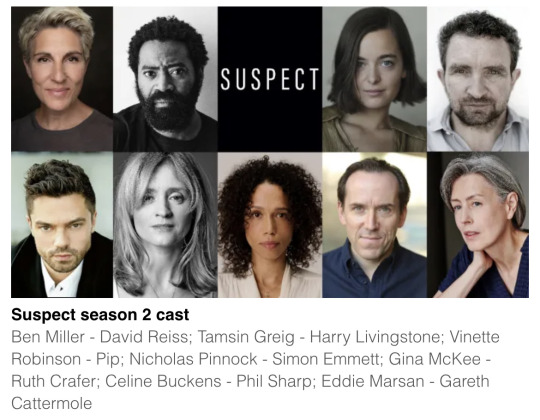
Dominic Cooper, Tamsin Greig and Eddie Marsan are among the names joining Anne-Marie Duff on season 2 of Channel 4 and BritBox International drama series Suspect.
Filming on the drama’s second run is underway, with Vinette Robinson (Boiling Point, The Lazarus Project), Eddie Marsan (The Thief, His Wife and the Canoe, Ray Donovan), Celine Buckens (Showtrial, The Ex-Wife), Nicholas Pinnock (Top Boy, For Life) and Gina McKee (Bodyguard, Our Friends in the North) joining Cooper (Preacher, Mamma Mia!), Greig (Friday Night Dinner, Belgravia) and Marsan (The Thief, His Wife and the Canoe, Ray Donovan).
Duff (Bad Sisters, The Salisbury Poisonings) stars in the series as Dr Susannah Newman. In the eight-part series, she is on a desperate quest to track down a self-confessed serial killer before he kills again that night. When a mysterious new client Jon (Cooper) admits under hypnosis that he is a murderer and intends on killing another young female that evening, Susannah knows he must be stopped at all costs.
I’m so pleased to be returning to Suspect to be able to dig deeper into the character of Dr Susannah Newman,” said Duff. “Expect lots of twists, turns and revelations alongside more questions to be answered. I can’t wait for viewers to see what we’ve done with the second series.”
Suspects comes from Professor T and Before We Die producer Eagle Eye Drama and is written by Joy Wilkinson (Lockwood & Co, The Watch) and David Allison (The Couple Next Door, Marcella). It is for UK network Channel 4, whose outgoing Head of Acquisitions Nick Lee bought it, and co-produced by BritBox International for the U.S. and Canada. The eight-part drama is being distributed internationally by Fremantle and will air in 2024.
Ben Wadey, Channel 4 Drama Commissioning Executive said: “We’re thrilled to be working with Eagle Eye Drama again to be bringing back Suspect for a second series. With Anne-Marie Duff returning as Dr Susannah Newman plus a truly spectacular ensemble cast that includes Dominic Cooper, Tamsin Greig and Eddie Marsan, Channel 4 viewers are truly in for a ride when this hits our screens.”
Reemah Sakaan, CEO BritBox International and executive producer added: “I am absolutely delighted that such a stellar ensemble cast is joining the incredible Anne-Marie Duff to tell the next chapter of Suspect Season 2. Joy Wilkinson and David Allison have delivered brilliant scripts and I know our BritBox International viewers in the US will be gripped from start to end.”
Carolina Giammetta (Before We Die, Hollington Drive) will direct. Eagle Eye’s Jo McGrath and Walter Iuzzolino are the executive producers and Dylan Rees (Heartstopper, Alice & Jack) is the series producer. Sakaan and Stephen Nye are the executive producers for Britbox International, which acquired the series following a deal brokered by Fremantle’s Lisa Honig, EVP Distribution North America.
Suspect is adapted from the Danish original Forhøret (Face to Face), which was created by Christoffer Boe and written by Christoffer Boe and Anna Juul. The original series was produced by Miso Film, a Fremantle company, and executive produced by Boe, Jonas Allen and Peter Bose who also serve as executive producers on Suspect.
The series has been produced in association with Happy Duck Films and the Belgian Tax Shelter. Fremantle handles global sales.
SH is not in “Suspect” 2 in association with Happy Duck Films🦆 his character seems to still be in a very deep stage of coma since Suspect 1 💁♀️
The interesting thing is there are various British actors who have played relevant character parts, a competent group to work with Happy Duck Films. The actors who pivot from films to TV or the other way around are large. As you can see there are plenty of choices.😉
Dominic Cooper is so talented, he's very witty. So a perfect package! his Ian Fleming role was his best.
dailymotion
3 notes
·
View notes
Text
Graden af gensidighed

Denne artikel blev oprindeligt publiceret i Jazz Special
Tekst: Gudrun Hagen
Foto: Kresten Hillerup
Kasper Tranberg – anerkendt trompetist, kornettist, komponist, underviser, radiovært med videre – fortæller om relationen mellem ord og lyd i sin musik. Som en inkarneret figur i dansk jazz, og blandt de efterspurgte musikere at arbejde sammen med herhjemme, er krydsfeltet mellem jazz og poesi igennem en årrække og ved en lang række samarbejder blevet udforsket, vendt og drejet i forskellige former. Men hvad er det med de digte? Og hvad kan de i kombination med improviseret jazz?
Kasper Tranberg tager imod på sit kontor ude på Rytmisk Musikkonservatorium.
―Huler skal man bygge, griner han, da han ser mig kigge rundt på de mange klenodier overalt i rummet. På væggene hænger der billeder af jazzlegender side om side med private foto fra diverse live-optrædener. CDer står i rækker og bunker omkring stereoanlægget, og på sofabordet er der fyldt med bøger.
―Nogle ligger der fast, andre bliver skiftet ud, og det er alt muligt blandet, fortæller Kasper beredvilligt, da han ser mig kigge nysgerrigt på bunkerne. Pia Juuls Sagde jeg, siger jeg-digte ligger øverst i en af dem.
―Jeg er her jo hele tiden faktisk. Hvis ikke jeg er på turné, så er jeg her. Det er mit arbejdsliv, så det er virkelig fedt og vigtigt at føle sig hjemme.
Historiefortælling og poesi
―De her ord føler du dig tydeligvis også hjemme i. Hvornår og hvordan kom du i gang med poesien?
―Det er fortællingen, der interesserer mig. Jeg har ligget under mine forældres køkkenbord, siden jeg var ganske ung, og omkring det har der siddet digtere, kunstnere, løgnere og ballademagere. Du ved, postmanden, lidt halvfuld onsdag klokken 16 – alt det der er jeg vokset op med. Jeg er flasket op på historiefortælling. Det har bare været omkring mig. Jeg er ikke litterær i den forstand. Jeg er fascineret af den verden, og sådan har jeg det også med klassisk musik for øvrigt. Jeg ved godt, hvad perioderne [de kunsthistoriske] hedder, men jeg kan ikke høre forskel på den og den komponist. Jeg har selvfølgelig nogle yndlingskomponister som Toru Takemitsu.
Kasper gør stemmen blid og viser det italienske prima-tegn med pege- og tommelfinger mod hinanden, for at indikere, hvilken høj kvalitet, vi taler om.
―Jeg er jo Japan-tosset, og med ham går jeg i dybden. Og det har jeg også gjort med poesien ud fra den improviserende musikers fundament. Da jeg som ganske ung mand for første gang hørte jazz og poesi med Peter Poulsen og Jens Søndergaard, du ved; Toooftegårds plads. Kasper synger hæst og drevent for at illustrere.
―Mega godt ikke’ griner han og fortsætter,
―Eller John Tchicai som midt i en solo fremsiger digte og bringer musikken og stemningen i rummet, og hele viben et andet sted hen. Du kan jo ændre det hele sådan her med ord! Kasper knipser.
―Så det er dér, jeg kommer fra med de ord. Inden for jazzen og den improviserede musik.
―Så det er et spørgsmål om stemning og stemningsskift?
―Ja. Og det har jeg også brugt i min musik, og gør det stadigvæk. Og de improvisatorer, som arbejder med ord, gør det samme. Der er jo også et budskab i fortællingen, i ordene, i digtet, i tekstmassen. Jeg har kammerater, som er digtere og arbejder med alle mulige former. Jeg har altid interesseret mig mest for den helt korte form. De få ord. Og ikke det sådan mere rablende. Måske lige med undtagelse af Cecil Taylor, som arbejder med mange ord og mange toner, altså en helt overvældende densitet. Det er sådan et godstog med ord, der kommer flyvende og kører en ned. Så sidder man der, kørt over, og tænker hvad skete der?
―Men ellers er det for mig mere noget med, hvor meget man kan få ud af hvor lidt. Altså det koncise udtryk. Det synes jeg er interessant.
―Hvornår bliver det interessant? Hvad er det, der gør de her ord og de her stemningsskift, man kan lave med dem, interessante?
―Jeg kan generelt godt li’ poetiske musikere. I mit nye orkester – The Future Ancestors – har vi arbejdet meget med metaforer. Der er ikke et nodepapir i miles omkreds. Der er kun lyd og metaforer, når vi arbejder med musikken. Og musik kan helt grundlæggende beskrives som et poetisk udtryk. Og jazzens store poeter har virkelig optaget mig meget. Det kommer i lidt forskellige udtryk. Om det er Thelonious Monk, eller pianisten Bill Evans – de er begge store poeter for mig. Derer selvfølgelig også noget med den syngende kvalitet af mit instrument, trompeten, som altid har optaget mig. Det vokale, det sangbare, det poetiske i den lyd. Miles Davis ligger lige for, eller min anden store helt, Timofei Dokschitzer, som også har den der poetiske, syngende kvalitet i trompetens klang.
Det vi kan dele sammen
―Hvornår bliver det så til ord? Hvornår er det poetiske i musikken ikke nok?
―Det ved jeg ikke, om jeg kan svare helt klart på. Kasper tænker lidt.
―Men der er en anden ting også: Det provokerende eller det overraskende i det. John Tchicai havde et digt i retning af: ”I want a big orgasm, said the litttle man.” Det kan også noget. Det er dragende. I min musik arbejder jeg ellers ikke med den erigerede langemand. I mit udtryk igennem årene har jeg altid ledt efter det, vi kan dele sammen. Der er ikke noget oprør i mine værker, plader eller måder at være på. Selvfølgelig har man været ungdomskæk, men som kerne handler mit bidrag om levels of mutuality. Altså hvilken grad af gensidighed, vi kan finde. Hvad er det gensidige, som musikken kan rumme? Det interesserer mig, og det er dét, jeg er bedst til. Og der er ordene en bro, der er virkelig fed. For de kan være præcise, konkrete, og især kan de være utrolig billedskabende hos modtageren.
―Jeg har spillet med pianisten Jacob Anderskov i 25 år, og han har igennem alle årene arbejdet med den danske sangskat. Det har jeg altid set lidt fra sidelinjen, men i det nye år kommer der en plade, som Jacob har lavet med danske sange, hvor to vokalister synger, og vi improviserer. Vi kaster et forholdsvis nyt lys på, hvordan man kan dele en sang, der kan stå i Højskolesangbogen. Og det har været rigtig fedt at ændre det oprindelige udtryk. At sige: Vi elsker denne sang men ud med første vers, lad os begynde med vers fire og bagefter spiller vi vers syv, og så er det det, griner Kasper og slår animeret ud med armene.
―Det er noget med at skabe en forbindelse imellem lytteren, og dem som spiller, men også at skabe nogle illusioner om, hvad en sang, og hvad budskabet i en sang, skal kunne. Vi har gjort det meget live. Vi har spillet med brandmandskor, og vi har spillet i sangforeninger og alt muligt. Vi improviserer, og så dukker sangene op. Og ordene dukker op i folks hoved med det samme, når man nærmer sig en sang, de kender. Live har vi prøvet at aftale med publikum at de skulle synge med, når vi gav tegn – sådan en alternativ form for fællessang – men det kom aldrig til at fungere. Publikum er konsekvent foran. De hører lidt af melodien, og så begynder de bare at synge, og som musiker er det sådan lidt: ”Hallo, vi skal også være med.” Ordet tilsat en melodi er simpelthen en diamant, der skinner hver gang.
Agurkesalat
―Et andet virkeligt sjovt projekt er Vi sidder bare her med Jørgen Leth, Mikael Simpson og Frithiof Toksvig. Jørgen er jo enormt jazzet. Jeg har spillet live med dem og er med på de første plader, og Jørgen skulle ikke have nogen cues. Timing havde han styr på. Det skulle han nok selv ordne. Han er improvisator i hjertet og elsker at være på scenen. Så i det band har min rolle været instrumentalisten, som farver rummet, der opstår mellem musikken og Jørgens testbidder. Og hvad gør man så, når det handler om agurkesalat – sådan en klagesang om agurkesalat, og skal spille noget der passer til? Kasper smiler bredt ved tanken.
―Det er pissesjovt. De fedeste er C.V. Jørgensen, Lars H.U.G., Nikolaj Nørlund, eller Hanne Boel, som også har den der direkte kommunikation i ordet. Jeg har gjort det med alle mulige, og nogle i den del af musikken er mere digtere end andre. Kasper smiler lumsk og stiller selv næste spørgsmål:
―For er der forskel på en digter og en sangskriver? Måske.
At Lytte og respondere
―Hvad skal være til stede i musikken og poesien, for at det hele går op i en højere enhed?
―Vi har alle en god ven, som bare taler hele tiden. Og ens opfattelsesapparat lukker ned. Der er ikke det vakuum, hvor forståelsen får rum, og hvor der kan opstå en form for dialog. Det er også i en vis forstand en form for timing, når man forstår at sige noget og nogle gange må man vente 10, 20, 40 sekunder, før den anden person har tænkt sig om, og kan respondere. Det er improvisation. Det er dialogen, det hele drejer sig om. Den umiddelbare og den reflekterede. Om det så er musik, et interview eller hvad som helst. Lige nu er der en real time-forhandling. Hvem siger hvad, hvornår? Hvad skal det handle om? Hvem bliver træt først? Det er det, vi som musikere egentlig gerne vil perfektionere. At lytte og respondere.Ord og musik lever godt sammen i improvisation. Det skal ikke tages så højtideligt. Det er ikke en formel øvelse. Det hele handler om relevans. Ordene kan være lige så meget loose guns, som jazzen kan. Det kender vi fra beat-generationen, punken, alle mulige. Sådan en som Pia Juul er også flabet på sin måde. Man bliver helt omsluttet af hendes ord. Det er sjovt, dybsindigt, drømmende, beskrivende, pirrende og … vedkommende! Ja, det er et godt ord. Noget, der har rigtig høj relevans, kan jo godt være skideskægt. Og weird, fjollet og alt muligt. Samtidig med at det er dødsens alvorligt.
Når samspillet mellem ord og musik virker bedst, så åbner to døre. Første dør åbner til en fundamental fælles forståelse af, hvad det vil sige at være i det her rum nu, eller at være menneske. Den anden dør åbner til en fuldstændig individuel fortolkning af, hvad det her drejer sig om. Og det er måske dét, den gode digter kan. Den gode poet, som spiller klarinet, så følelserne reagerer. Der kommer gåsehud, eller vi bliver megaglade. Det kan vi alle sammen mærke. Umiddelbart. Men lige så mange lyttere der er, lige så mange drømmebilleder, opfattelser og oplevelser vil der være. For mig handler det om at komme frem til at have noget på hjerte. En stærk intention. Og at have noget i en fortælling, der måske fremstår ret uhøjtideligt, underligt eller måske skaber forundring. Det tiltaler mig. Som musiker vil man også gerne have det swinger. Det skal sgu være funky, ellers er det ikke så sjovt for mig i hvert fald.
―Er det dialogen og samarbejdet i dette møde mellem musik og ord, der er det sjove?
―Ja, blandt andet. Folk vil gerne have mig med, fordi jeg er god til at være i et band. Jeg er blevet 52, så jeg er erfaren. Du kan finde trompetister, som spiller bedre end mig, er federe til at læse noder og kan spille højere og hurtigere og alt muligt. Men det er svært at finde nogen, som kan forstå og gå ind i en proces, løfte den og være megabegejstret og være så god til at sætte sig i projektejerens sted. Det er dét, jeg har levet af i mange år. Det er sjovt at være den deltagende brik – en bifigur – og derfor er jeg også pissegod til det. Selv med mine egne ting er jeg drevet af samarbejdet. Drevet af oplevelser eller mennesker. Mit forrige album var en solotrompet-plade, og der er man ret meget alene, men det nægter jeg. Så jeg rakte ud til Mike Højgaard, og vi lavede filmen Suite Dilation [tilgængelig på filmstriben]. Der havde jeg lige fået Ben Webster-prisen, og det er jo en retning af jazzen, der ikke er så avantgardistisk, men jazzen favner det hele. Lige fra Aristocats-swing til et abstrakt Kresten Osgood-beat. Det er bare at følge med. Pulsen i musik og i poesi, det er stemning og fortælling. Man bliver taget med på forskellige måder. Når man som musiker får en helt eller heltinde, bliver det en livskammerat. Når jeg for eksempel hører Don Cherry eller Ben Webster, så er det nogle, jeg har haft med mig, og som jeg vil have med mig, til jeg går i graven. Det er dybt ad helvede til, og det er virkelig fedt. Og nogle gange bliver det til et digt.
―Det ”sjove” er også i høj grad smittende originalitet og kreativitet fra andre, der kan sætte noget i gang. Igennem mange år har jeg for eksempel været tæt på TS Høegs virke og værker. Thorstens output er af svimlende karakter og inspirerende! Drivkraften i hans poetiske og litterære visioner har betydet meget for mig og mange i min generation, og nu også i den generation, der er kommet efter, fordi han, ligesom Hugo Rasmussen gjorde, ofte omgiver sig med yngre kræfter og skaber forbindelser på tværs af alder, æstetik og udtryk. Det er en af kernerne i musikalske fællesskaber, og det er jeg stor tilhænger af.
Megen mening i kondenseret form
―Hvorfor har du aldrig udgivet en lyrikplade i eget navn?
―Jeg skal finde måden at gøre det på. Kasper ser tænksom ud og lader stilheden fylde.
―Jeg har kun skrevet et par håndfulde digte eller tekstbidder, som jeg synes fungerer godt i musikalsk sammenhæng. Jeg bruger dem, når jeg spiller solotrompet, eller jeg bruger dem i improvisations-sammenhænge. Det lyrikbårne værk nærmer jeg mig rigtig langsomt, men jeg ved at det bliver med en blanding af mine og andres tekster. Nok andre improviserende musikeres tekster. Jeg har hørt gode statements live, som jeg har transskriberet – de findes slet ikke på tekst. Og så måske nogle omskrivninger af for eksempel Santoka Taneda, en free-haiku-poet af guds nåde, som jeg elsker. Kasper bladrer entusiastisk rundt i en af sine bøger, der ligger øverst i en af bunkerne på sofabordet foran os.
―At få megen mening ud i kondenseret form, det interesserer mig også på trompeten. Det går virkelig hånd i hånd med Haiku. Den måde at spille den rigtige tone på det rigtige tidspunkt. Det er måske den største udfordring.
―Hvad har du af kommende ordrige projekter?
―Der kommer en solo-trompetplade, hvor de her digte bliver optaget. Måske jeg spiller klaver på noget af det, men der kommer et poesiværk, jeg håber vil tilføre lytteren og mig andre ruter og muligheder i det, vi skal dele sammen. At jeg kan møde mig selv og lytteren på en anden måde, når ordene er der. … Det er en måde at få mig selv ud på gyngende grund.
―Nogle musikgrene har en afviklende karakter – det kan findes i al kunst – så kan det blive en ting. Mit håb er at dette projekt bliver udviklende. Jeg overvejer, hvordan jeg skal angribe den udgivelse. De tekster skal i hvert fald ud og have et liv nu, hvor de dokumenteres i et sammenhængende værk, for nu har de været der rigtig længe. Så kan jeg komme videre. Det er der behov for. Nogle af de tekstbidder har jo levet med mig i årevis.
―Og så har jeg et stort igangværende forskningsprojekt her på skolen, hvor jeg forsker i melodik og forsøger at afsøge nye tilgange til at bruge melodik som improviserende musiker. Også i forhold til den musikpædagogiske dimension af at arbejde med melodik i improvisation. Når det er færdigt om halvandet år, vil jeg arbejde på en sang-plade, som vi har snuset til. Jeg spillede en koncert på Hotel Cecil i maj måned med mit nye orkester, The Future Ancestors – mit elektriske band – hvor Mikael Simpson og Lucky Lo kom og sang et par sange hver.
―Hvad handler det repertoire og udtryk om?
― Live your life like a future ancestor. Kasper dvæler lidt.
―Hvad har efterlivet og livet tilfælles? Hvad er det for en type ancestor, man selv bliver? De spørgsmål bor inde i nogle sange, nogle hymner – både europæiske, amerikanske og afrikanske og alt muligt. Det er en helt ny undersøgelse. Det er de to orddrevne projekter, jeg har på vej.
Kærligheden til det orddrevne
―Jeg har et nogenlunde sprog til at beskrive musik, men det er svært for mig at beskrive poesi. Der er jeg lidt på udebane. Men det rører noget i mig. Jeg læner mig nok ind i improvisatorens brug af ord. Når noget optager mig, så kan jeg godt blive der længe og vende og dreje det. Jeg læser mange fagbøger om musik og portrætter af musikere. Så faglitteratur fylder en del, og jeg skriver også, hvis jeg giver Master Classes eller har oplæg her på skolen, så skriver jeg typisk reflekterende essays. Jeg har klart en kærlighed til at beskrive en proces, eller hvad jeg tænker om ting. Jeg skriver også breve til folk, det kan jeg godt li’. Men man bliver respektfuld. Det er et krævende område. Så jeg gør mig umage med ikke at fremstå som et litterært menneske. Jeg vil til gengæld gerne have at det fremstår som en dimension af min musikalitet og en dimension af min måde at være sammen med mennesker på. Jeg er måske lidt berøringsangst, men ordene kalder på mig hele tiden. Og nogle gange, så får jeg lov – af mig selv – til at skrive dem ned.

0 notes
Video
youtube
Realism is Bad, Actually
Offset your carbon footprint on Wren: https://wren.co/start/zoebee The first 100 people who sign up will have 10 extra trees planted in their name!
* Description: *
We say we love "realistic" fiction like Batman, Red Dead Redemption 2, and Horizon: Forbidden West. We say we love when our characters "act like real people" and "have realistic dialogue." But it's worth asking: Are these things ACTUALLY realistic? And if not, is realism even worth trying to capture?
* chapters: *
00:00:00 - Intro: Concrete Monsters
00:04:17 - Part 1: Using Realism
00:10:34 - Part 2: Investigating Realism
00:17:27 - Part 3: Criticizing Realism
00:40:32 - Intermission
00:43:17 - Part 4: Replacing Realism
00:59:16 - Conclusion: Sounds Good
01:08:39 - Outro & Poem
* Sources: *
---Books
------“Gamic Realism”: Player, Perception and Action in Video Game Play - Hanna Sommerseth
------Half-Real: Video Games between Real Rules and Fictional Worlds - Jesper Juul
------Hunting the Dark Knight - Will Brooker
------Imaginative Realism: How to Paint What Doesn't Exist - James Gurney
------Maps of the Imagination - Peter Turchi
------Method and Madness - Alice LaPlante
------reality tv: realism and revelation - Anita Biressi and Heather Nunn
------Rules of Play - Eric Zimmerman and Katie Salen
------The American Monomyth - Robert Jewett and John Shelton Lawrence
------The Militarization of Childhood - ed. J. Marshall Beier
------The Rules of Play - Katie Salen and Eric Zimmerman
------What is Cinema? - Andre Bazin
---Articles
------“A Grounded Investigation of Game Immersion” - Emily Brown and Paul Cairns
------“Foley Sounds vs Real Sounds” - Stefano Trento and Amalia De Götzen
------“Footsteps with character: the art and craft of Foley” - Benjamin Wright
------“Making fictions sound real – On film sound, perceptual realism and genre” - Birger Langkjær
------“Perceived realism and the CSI-effect” - Logan A. Ewanation, Susan Yamamoto, Jordan Monnink & Evelyn M. Maeder
------“Reading Realism: Audiences’ Evaluations fo the Reality of Media Texts” - Alice Hall
------“Realism in FIFA? How social realism enabled platformed racism in a video game” - Sam Srauy and John Cheney-Lippold
------“Selling Marvel's Cinematic Superheroes through Militarization” - Brett Pardy
------“Skeleton Keys: Teaching the Fiction of Narrative Truth” - Douglas P. Felter
------“Social Realism in Gaming” - Alexander R. Galloway
------“The One Measure of True Love Is: You Can Insult the Other” (Interview) - Sabine Reul and Thomas Deichman
------“The Perceived Realism of African American Portrayals on Television” - Narissra M. Punyanunt-Carter
------“Videogames of the oppressed: critical thinking, education, tolerance and other trivial issues” - Gonzalo Frasca
---Videos
------"Reality Isn’t Always Right" - Solar Sands ( • Reality Isn't Alw... )
------"SHUT UP ABOUT PLOT HOLES" - Patrick (H) Willems ( • SHUT UP ABOUT PLO... )
------"What's the Point of R-Rated Superheroes?" - Patrick (H) Willems ( • What's the Point ... )
------"Why Do We Care if Movies Are "Realistic?" - Patrick (H) Willems ( • Why Do We Care if... )
------“MASSIVE sound design breakdown of The Lord of the Rings Trilogy” - INDEPTH Sound Design ( • MASSIVE sound des... )
* Further Watching: *
---"How Animal Sounds Are Made For Movies And TV | Movies Insider" - Movie Insider ( • How Animal Sounds... )
---"Does Representation Matter?" - Legal Kimchi ( • Does Representati... )
* quote reads (in order of appearance) *
---Caelan Conrad
------Twitter: https://twitter.com/CaelanConrad
------YouTube: / caelanconrad
---Mica (Ponderful)
------Twitter: https://twitter.com/PonderfulYT
------YouTube: / @ponderfulyt
---Little Hoot
------Twitter: https://twitter.com/hoot_little
------YouTube: / littlehoot
---Aranock
------Twitter: https://twitter.com/Aranock1
------YouTube: / @aranock
* edited by Charlie Flowers *
YouTube: / @xxinrealtimexx
Twitter: https://twitter.com/xXinrealtimeXx
* To Support Me: *
---Become a channel Member! ➤ / @zoe_bee
---Join the Patreon! ➤ https://www.patreon.com/zoe_bee
---Make a one-time donation! ➤ https://ko-fi.com/zoebee
---Join the Discord! ➤ https://discord.gg/8GBmS9Qug9
---Check out my second channel! ➤ / @zoecee
---Watch my D&D game! ➤ / @thejaycorn
---Watch my Blades in the Dark game! ➤ https://www.twitch.tv/itucrew
(disclaimer: This video was sponsored by Wren.)
#Zoe Bee#realism#realism is bad#plausibility#typicality#factuality#involvement#narrative consistency#perceptual pervasiveness#what is realism#immersion#mirroring experience#mirroring reality#emotionally evocative#idealized version of reality#audience story contract#dress-up
0 notes
Text
TOC: Constructions and Frames Vol. 14, No. 1 (2022)
ICYMI: 2022. v, 223 pp.
Table of Contents
Introduction:
Variation and Grammaticalization of Verbal Constructions
Gabriele Diewald and Dániel Czicza
pp. 1–12
Articles:
You don’t get to see that every day: On the development of permissive get
Martin Hilpert and Florent Perek
pp. 13–40
She has a stadium named after her : Meaning variation in spoken interaction
Berit Johannsen
pp. 41–77
The affactive få ‘get’ construction in Danish: Afficiaries, agentivity and voice
Peter Juul N http://dlvr.it/Sc1HwH
0 notes
Text
For decades, Silicon Valley had been dominated by the mythology of Steve Jobs. The acid-dropping hippie CEO had argued that technology could be a form of creative expression, and he convinced a generation of entrepreneurs that they should invent products that would improve the lives of their customers. This was the “‘bicycle for the mind’ value system,” says Roger McNamee, the founder of the venture-capital firm Elevation Partners, and it filtered into many of the most successful companies of the ’90s and ’00s.
Thiel despises the counterculture (he dates the precise beginning of American decline to Woodstock) and is contemptuous of the notion of creativity for its own sake. For Thiel, the purpose of founding a company is to control your own destiny. “A startup is the largest endeavor over which you can have definite mastery,” he wrote. A new generation of entrepreneurs, coming of age in the wake of the financial crisis, embraced his ideas. Thiel told them to flout norms and seek lucre, not impact. “Only one thing can allow a business to transcend the daily brute struggle for survival,” he wrote. “Monopoly profits.” Perhaps his single best student has been Mark Zuckerberg, who built a monopoly in his industry and used it to crush competitors and charge progressively higher fees to advertisers — all while telling the world that this essentially predatory behavior was a social good.
With Thiel’s encouragement, tech would “move fast and break things,” as the Facebook motto put it, and executives believed it was better to ask forgiveness than permission. The industry that developed would be defined by these clichés, convincing itself that “disruption” wasn’t just an unfortunate consequence of innovation but an end in itself. Thielism would show up even at companies where he was not an investor: at Juul, the e-cigarette company that marketed to children; at Robinhood, which tempted novice investors with volatile investment products; and at Uber, which paid drivers less than minimum wage and violated statutes with apparent glee.
McNamee, an early adviser to Zuckerberg who turned apostate and published Zucked: Waking Up to the Facebook Catastrophe, sees this recent history as an expression of Thiel’s values. As he put it to me, “The PayPal Mafia philosophy became the founding principle for an entire generation of tech companies.”
- Peter Thiel’s Origin Story: His ideology dominates Silicon Valley. It began to form when he was an angry young man by Max Chafkin
#sillicon valley#steve jobs#peter thiel#mark zuckerberg#monopoly capitalism#facebook#paypal#juul#uber#robinhood#entrepreneur#eat the rich#capitalism#privilege#technology#libertarianism#propertarianism
6 notes
·
View notes
Text

finally SOMEBODY gets it. he's even critiquing juul which i find sooooooo affirming.
#peter posts#juul has made many contributions to game studies. but some of them are boring and not good#also i would be interested to look at his critique of game studies vs videogame studies from the angle of like.#guys who are interested in Designing Games (analog or digital) & their cohorts#vs. the more traditional academic who is. paradoxically. nontraditional in this approach#metanarratives
12 notes
·
View notes
Video
youtube
Tales from the Multiverse, a short film by Tumblehead (Magnus Igland Møller, Mette Tange & Peter Smith)
#somethingneweveryday#it's not a bug it's a feature#short film#short#god#animation#creation#tumblehead#magnus igland møller#mette tange#magnus møller#peter smith#mads juul#thomas richard christensen#adam lawters#tobias orderup#stephy coffey#humour#geek humor#geek humour#humor#magnus i. møller
30 notes
·
View notes
Text
AUNT MAY TOOK AWAY MY JUUUUUUUUUUUUUUUUL



#(;lJKHBSKDJBHNKSADMLASD)#(I JUST SAW A GIFSET OF THIS SCENE AND WENT)#('AW CUTE IVE NEVER SEEN GIFS OF THIS BEFORE')#(AND THEN REALIZED IT LOOKS LIKE HES JUULING KJSDFHK)#(god damnit peter ur better than this)#{ my secret identity; ooc }#drugs mention tw
5 notes
·
View notes
Conversation
Art Baker: The smoke machine broke!
Hank Olson: I could stand behind it and vape.
Peter McVries: You are an atrocity.
#the long walk#hank olson#art baker#Peter mcvries#incorrect long walk#Olson has a juul sorry I don't make the rules#source: brooklyn nine nine
9 notes
·
View notes
Note
hey i’m kinda annoyed, bc i think this guy used me to get this girl he liked jealous by telling her he liked me. & now he’s trying to act like nothing happened thank god i never liked him tho. but she also was telling me i was never used but i know i was. 😤
god, people suck. i see this sort of thing play out all the time. the other day someones boyfriend accused them of stealing their juul and they broke up. over some stupid thing that literally effects how you breath and is bad for you?? its so pointless. im sorry dude, just know that i see and experience stupid stuff like this too!!
#peter parker#tom holland#anon#//wow we love making answers realistic#//juuling is bad for u change my mf mind i dare u
3 notes
·
View notes
Text
Remus Lupin, 2021:
Retired secondary school teacher
Taught literature after getting a degree after Hogwarts
Got fired a few times for his "unorthodox" teaching methods
All of his students over the years loved him
Some of them even go visit him to listen to his stories and his advice
Has a small scar on his forehead from his and Sirius' 1st Pride in '81
It's the one scar he doesn't mind showing
Remained very politically active in muggle politics
Was the kind of teacher that gives his opinion without giving it (nods, raising his eyebrows, satisfied smiles)
So all of his students knew he was a raging leftist (yes remus is a leftist you asses)
Really liked oragnising debates in his classroom
His students always gifted him socks for Christmas
Sirius always brought him flowers on the last day of school and Remus complained that the students liked him better
Wrote a book on new teaching techniques and dynamics
Was the teacher the queer kids came out to
Accidentaly swore in class
Learned to crochet, learned it relieved stress, so Sirius and Jily's kids sport new hats and gloves every winter
Big fan of the Hunger Games after a student recommended it to him
Dedicates a whole week to thoroughly dissecating it in class
Uses magic only at home
The whole week before Halloween, he, Sirius, James, and Peter have a big prank event. Still going strong at 60
Smokes the juul thing and Sirius snobs him because he refuses to smoke anything other than prerolled cigs
"What flavor did you choose today, Moony? Mango? Strawberry shortcake? Pumpkin pastries?" "Fuck off." "Tobacco?"
Before the full moon he and Sirius go on long walks to keep a good shape
Thanks to Lily's work, the transformations aren't as bad as before
He still is a bit sore but that's just his bones getting old
He went full gray at 47 and Sirius teases him constantly
When Sirius gets in a mood he does the cooking
Meaning they eat pasta for two full days
He's the BIGGEST music snob ans refuses to listen to anything that came out after '90
Until he finds Hozier and his little lit nerd heart is full
Can't stand musicals but Lily and Sirius are the biggest Hadestown fans
He really likes TV sitcoms though
His favorite is Parks and Rec because he can make fun of Americans and their govt
(Although he cannot go one day without ranting about the bristish govt and the fuCKING MORNARCHY, PADS)
April 8th and 9th are his favorite days ever
Organized a party for each occasion
Had previously vowed he would outlive Thatcher and Prince Philip
Plans to outlive the queen and Boris Johnson too
"I swear that's the only bloody thing keeping him alive, Prongs."
He and Sirius got married under muggle law on June 12th 2014 in Wales
The only guests were Lily and James and ONLY because they needed witnesses
They live in a cottage in the Welsh countryside
The sea is just an hour away by drive
Remus has an old volkswagen that Sirius hates
(But that's fair because Remus hates Sirius' motorcycles)
The house is messy but it's cozy and Remus loves coming home to his husband
He still wears jumpers all year but finally agrees to take his top off at the beach and at James and Lily's pool
Easter is spent at theirs and for Christmas they go to James and Lily's
But they see each other for tea every weekend
Ever since his retirement he works at the local library
He got one tattoo and it's a small cat just to piss off Sirius
The story behind it is Lily's 40th birthday party where he got proper drunk for the first time in ages
He and Sirius had fought about a plate of broccolis forgotten on the couch
So to get back at him he got a cat tattoo on his forearm
It's small but Sirius didn't talk to him for a week
Now it has been nicknamed "Pissy"
He's the godfather of James and Lily's second kid
Harry's children love their great uncle Moony and their uncle Padfoot
(Sirius refuses to be called "old" in any way shape or form)
Remus really likes the title he wasn't expecting to make it this far
#remus lupin#remus lupin headcannons#they're old and happy#my favorite boomer#moony#wolfstar#sirius black
99 notes
·
View notes